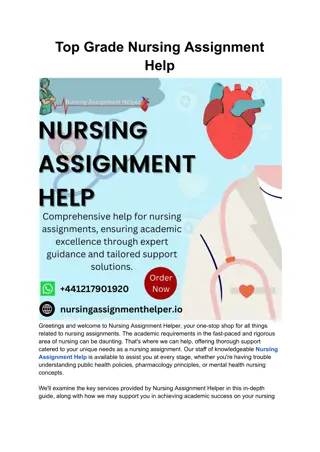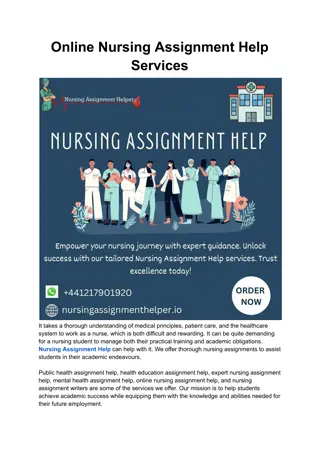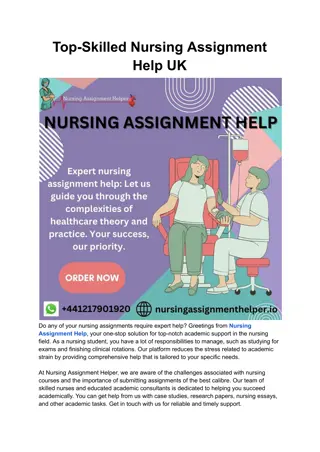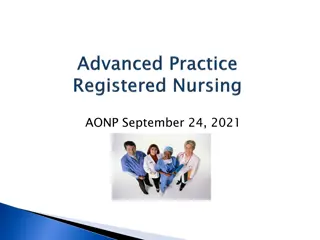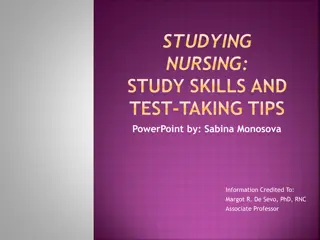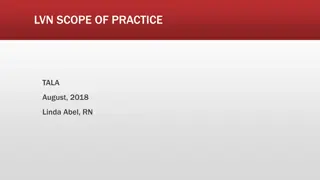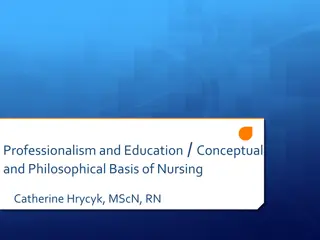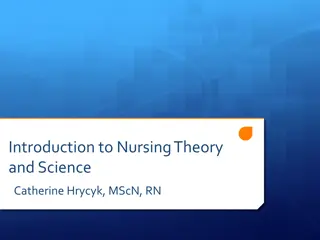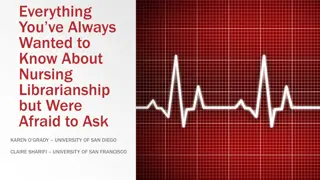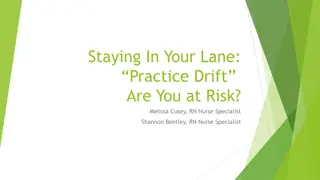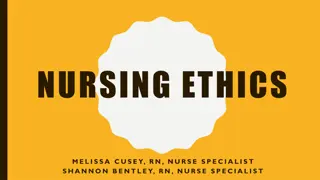Importance of Education in Nursing Practice
Patient and staff education play a crucial role in nursing practice, helping individuals understand self-care responsibilities. Historical foundations and current trends highlight the significance of nurses as educators in a changing healthcare landscape. Organizations like JCAHO set standards for patient education, emphasizing the right to accessible information. Nurses have a key role in promoting healthy behaviors and lifestyles through education.
Download Presentation

Please find below an Image/Link to download the presentation.
The content on the website is provided AS IS for your information and personal use only. It may not be sold, licensed, or shared on other websites without obtaining consent from the author. Download presentation by click this link. If you encounter any issues during the download, it is possible that the publisher has removed the file from their server.
E N D
Presentation Transcript
Overview of Education in Health Care
Overview of education in health care Historical foundations of nurses teaching role Social & economic trends impacting health care Purpose of patient and staff education Education process Role of the nurse as an educator Barriers to education Perspective on research in patient education
Introduction Patient and staff education are important in nursing practice Families and patients must be prepared to assume responsibility for self care Demand for nursing and nurse as educator continues in a changing health care system
JCAHO (Joint Commission on Accreditation of Healthcare Organization) established nursing standards for patient education Patient s bill of rights established the patient's right to receive complete and current information about diagnosis, treatment, prognosis, in an understandable way. To accomplish these goals, nurses need to be trained and prepared to provide patient education.
Historical foundations for teaching role of nurses Education is not a new thing Patient teaching is an independent nursing functions Florence Nightingale devoted her career to educating others about importance of nutrition, exercise, .etc.
1918 the NLN observed the importance of health teaching as a function within the scope of nursing practice. 1950 identified course content dealing with teaching skills, developmental and educational psychology, principles of education common for all nursing schools. Currently teaching is included within the scope of nursing practice responsibilities (Nursing Practice Act NPAs)
Social and economic trends impacting heath care National health care goals (healthy people 2000). Established objectives to develop effective health education programs to assist individuals : o recognize and change risk behaviors, o adopt and maintain protective health practices, o make appropriate use of health care delivery system Nurses can play a role in educating people about healthy and protective lifestyles.
Social changes cont. Growth of managed care, shift in payer coverage, led to emphasis on outcome measures, which is achieved by patient education Importance of economic and social values in preventive measures Political emphasis on reducing costs of health care delivery, through preventive measures.
Social changes cont. Nurses are defining their role with a focus on patient education as central to the practice of nursing Consumers are demanding an increase in knowledge and skills on how to care for themselves and how to prevent disease. The increase in chronic and incurable conditions requires that individuals and families become informed participants to manage their own illnesses
Social changes cont. Increase in the number of older people, created the need for consumers to rely more on self care to maintain health. Major causes of death are diseases that are lifestyle related and can be prevented through health education Advance technology increased complexity of care, and gave clients ability to move away from health care setting
Changes cont. Early hospital discharge made families and client more self reliant. Patient education is believed to improve compliance and thus improve health status. Emergence of successful self help groups led to the public and nurse involvement and support for educational activities
Purpose, benefits, goals of patient and staff education Benefits of patient education o Improve quality of life o Increase consumer satisfaction o Ensure continuity of care o Reduce the incidence of complications of illness, o Decrease patient anxiety o Maximize independence in performing daily activity life. o Energizes & empowers people to be involved in the planning of their care
Purpose cont. The purpose of patient education is to increase competence and confidence of clients for self management The role of the nurse is to support patients through the transition from Being invalids to being independent, active learners, and participants in the care
Nurses role as educators enhances job satisfaction because of the benefits the patient gets. Staff development is important to keep nurses up to date with new information so that they can do their job successfully.
Education process defined A systematic, sequential, planned, course of action consisting of two major interdependent operations, teaching and learning, which form a continuous circle. Process includes the teacher and the learner. Education process should be mutual. The instruction content is based on assessment and prioritization of the client s learning needs, readiness to learn, learning styles.
Definition cont. Education process includes assessment, planning, implementation, and the evaluation. Teaching: is a deliberate intervention that involves the planning and implementation of instructional activities and experiences to meet intended learner outcomes according to the teaching plan. Learning: a change in behavior (knowledge, skills, attitudes) the result from exposure to environmental stimuli.
Definition cont. Patient education: a process of assisting people to learn health related behaviors in order to incorporate them in their lifestyle, to achieve the goal of optimal health and independence in self-care. Staff education: the process of influencing the behaviors of nurses by producing changes in knowledge, attitudes, values, and skills required to maintain and improve their competencies for the delivery of quality care to the consumer.
Definition cont. ASSURE model is a paradigm that can assist nurses to recognize and carry out the education process o Analyze learner o State objectives o Select instructional methods and tools o Use teaching materials o Require learner performance o Evaluate/revise learning process.
Nursing process Appraising physical & psychological needs Education process Ascertain learning needs, readiness to learn, & learning style ASSESSMENT Develop teaching plan based on mutually predetermined behavioral outcomes to meet individual needs PLANNING Develop care plan based on mutual goal setting to meet individual needs IMPLEMNTATION Perform the act of teaching using specific instructional methods & tools Carryout nursing care interventions using standard procedures EVALUATION Determine behavior changes (outcomes) in knowledge, attitudes, & skills Determine physical & psychosocial outcomes 19
Role of the nurse as educator Nurses play a major role in patient education Nurses must be trained in instructional skills in order to have successful educational programs Some suggest that education should be done only by specialized nurses, or nurses who have a higher level of education Nurses must have a solid foundation in the principles of teaching and learning
Role of nurse cont. Effective education and learner participation go hand in hand. Nurse can act as a facilitator, motivate individual to learn, create a positive environment for learning. Nurse can act as a coordinator of teaching efforts and client advocate (support) The teaching role is a unique part of our professional domain
Barriers to education and obstacles to learning Barriers to education are those factors impeding the nurse s ability to deliver educational services. Obstacles to learning are factors that negatively impact on the ability of learner to attend to and process information.
Barriers To Teaching Lack of Time to teach is cited by nurses Lack of competency & ability of the nurses Low priority is often assigned to patient education by administrators Lack of proper environment Lack of documentation of patient education
Obstacles to learning The stress and anxiety of the disease affects learners ability to learn The negative environment of the hospital, lack of control, lack of privacy, social isolation affect the patient s active role in decision making & involvement in the teaching- learning process. Lack of time because of rapid patient discharge
Obstacles to learning cont. Learner s characteristics like readiness to learn, motivation, and compliance The amount of change needed from the learner can dissuade (discourage) from accomplishing objectives Lack of support Inconvenience, complexity of the health care system results in abandonment of the learning and the learning objectives







